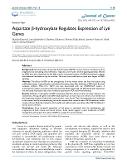Aspartate β-hydroxylase Regulates Expression of Ly6 Genes

Author
Číhařová, Barbora
Publication date
2024Published in
Journal of CancerVolume / Issue
15 (5)ISBN / ISSN
ISSN: 1837-9664ISBN / ISSN
eISSN: 1837-9664Metadata
Show full item recordCollections
This publication has a published version with DOI 10.7150/jca.90422
Abstract
Background: Overexpression of aspartate β-hydroxylase (ASPH) in human tumors contributes to their progression by stimulating cell proliferation, migration, and invasion. Several signaling pathways affected by ASPH have been identified, but the high number of potential targets of ASPH hydroxylation suggests that additional mechanisms may be involved. This study was performed to reveal new targets of ASPH signaling.Methods: The effect of ASPH on the oncogenicity of three mouse tumor cell lines was tested using proliferation assays, transwell assays, and spheroid invasion assays after inhibition of ASPH with the small molecule inhibitor MO-I-1151. ASPH was also deactivated with the CRISPR/Cas9 system. A transcriptomic analysis was then performed with bulk RNA sequencing and differential gene expression was evaluated. Expression data were verified by quantitative PCR and immunoblotting.Results: Inhibition or abrogation of ASPH reduced proliferation of the cell lines and their migration and invasiveness. Among the genes with differential expression in more than one cell line, two members of the lymphocyte antigen 6 (Ly6) family, Ly6a and Ly6c1, were found. Their downregulation was confirmed at the protein level by immunoblotting, which also showed their reduction after ASPH inhibition in other mouse cell lines. Reduced production of the Ly6D and Ly6K proteins was shown after ASPH inhibition in human tumor cell lines.Conclusions: Since increased expression of Ly6 genes is associated with the development and progression of both mouse and human tumors, these results suggest a novel mechanism of ASPH oncogenicity and support the utility of ASPH as a target for cancer therapy.
Keywords
tumorigenesis, Ly6 family, ASPH inhibitor, RNA sequencing
Permanent link
https://hdl.handle.net/20.500.14178/2191License
Full text of this result is licensed under: Creative Commons Uveďte původ 4.0 International







